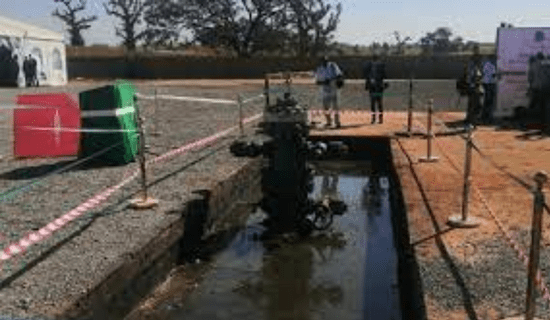News
Over Ten CSOs Kick, As Preparation To Resume Oil Exploration In Ogoniland Enters Top Gear

By Joseph Ebi Kanjo
A coalition of civil society organisations has called on the Federal Government and oil companies to halt the planned resumption of oil exploration in Ogoniland, Rivers State, Nigeria.
This is contained in a statement endorsed by Health of Mother Earth Foundation (HOMEF); We the People; Policy Alert; Peoples Advancement Centre; Peace Point Development Foundation and seven other civil society organisations.
The civil society organisations, while expressing deep concern that 33 years after the people of Ogoni made their demands contained in the Ogoni Bill of Rights, none of their concerns and prayers have been addressed, said “it is disappointing and demonstrates insensitivity for the government to imagine that those concerns have simply withered away with time.”
“Those of us who remain connected to the communities know for a fact that the Ogoni people remain resolute in their resistance to any renewed hydrocarbon extraction in their domains,” they added.
The statement reads in part: “As Civil Society Organizations in Nigeria, we have keenly observed the scheming and unhindered contestations over the resumption of extraction of oil in the disputed oilfields of Ogoniland.
“Over the last decade, we
have seen scheming by Shell and the Nigeria government- including resort to court processes- to resume drilling for crude oil with its attendant environmental, social and security recklessness in Ogoniland.
READ ALSO: International Day For Biological Diversity: HOMEF Calls For Preservation, Reconnection To Nature
“The latest contestation follows the visit of some Ogonis to President
Bola Tinubu ostensibly with the mandate of the Ogoni people to negotiate the resumption of oil extraction in the area.
“It is particularly disappointing to see that, in the fight over OML 11
and the resumption of oil extraction in Ogoniland, there has been no
mention or discussion of getting the indigenous Ogoni people free, prior and informed permission.
“It is unclear whether any consultations have taken place with the impacted communities, or whether their rights to a safe environment and interests have been considered.
“We believe that these recent attempts are callous, ill-advised, and capable of inciting suspicion and conflict in an already tense and conflict-prone area.
It is also gravely disconcerting that in the ongoing frenzy, the
concerns raised by the Ogoni people 33 years ago which led to the termination of oil extraction have not been addressed.
“Similarly, there has been no attempt to secure justice for the countless families that lost lives, livelihoods, and properties in what is still the worst attack on a peaceful indigenous population by Nigerian security forces.
READ ALSO: Drug Trafficking Trial: Court Grants Abba Kyari 2 Weeks Bail
“Persons who committed acts of genocide and abuses against unarmed populations, and boasted publicly about it, have still not been brought to justice. For the majority of Ogonis, the events of the 1990s remain an open and sour wound, begging for the healing of truth and justice.
“Critical to this is the fact that the moves to resume the extraction of
oil in Ogoniland is happening against the backdrop of the contentious clean-up of polluted sites in Ogoni.
“In 2012, Hydrocarbon Pollution
Remediation Project (HYPREP) was set up to lead and coordinate the
activities needed to implement the recommendations of the UNEP report on oil contamination in Ogoniland, including cleanup activities.
“The cleanup has been marred by concerns of irregularities, and in many instances low quality of job done and contract racketeering. These have created peculiar difficulties in the cleanup process.
“It is worrying why the government will decide to resume oil extraction
in Ogoniland when the pollution of the last decades is yet to be cleaned and the recommendations of UNEP are yet to be fully complied with.
“How does one explain the fact that a site supposedly being cleaned up will resume full oil extraction activities with all the pollution that comes with it?
READ ALSO: Catholic Monk Comes Out As Transgender, Urges Church To Embrace Trans Members
“For the avoidance of doubt, it should be noted that the Niger Delta as a whole has become the epicentre for hydrocarbon pollution in need of immediate remediation.
“The environmental assessment of Ogoniland report released by the United Nations Environment Programme (UNEP), and the May
2023 Bayelsa State Oil and Environmental Commission (BSOEC) report both demonstrate beyond any reasonable doubt the scale of destruction and the
true costs of extracting oil and gas.
“We are deeply concerned about the neglect of key issues around
ecological and social justice in Ogoniland. The world recognizes that the people of Ogoni have suffered unprecedented pains and loses onaccount of oil extraction.
“No apology has been rendered for the destruction of their environment, the killing of their people, the loss of their livelihoods, the destruction of their villages, the forced exile of their people and the murder of their leaders. To assume that the extraction of oil can commence whilst these issues remain on the front burner, is to be naïve at best and cruel at worse.”
They, therefore, urged concerned authorities to “concentrate on redeeming the ecological
disaster in the area, decommissioning aged oil infrastructure, replacing
the lost livelihood of the people and securing justice for the countless
Ogonis waiting for closure”
News
Edo SWAN Distances Self From Online Publication Against Enabulele

…demands retraction, warns member against unverified publication
The Sports Writers Association of Nigeria (SWAN), Edo State Chapter, has distanced itself from an online publication titled: ‘Samuel Ogbemudia Stadium Shut Against Stephen Keshi.’
A statement signed by the Secretary of the association, Comrade Idahosa Moses, Edo SWAN said neither was it consulted nor involved in the “framing of the narrative presented by the online publication.”
Edo SWAN described the publication as misleading, sensational and grossly lacking in factual balance.
The statement partly reads: “SWAN finds the report inconsistent with the ethical standards and core values of the journalism profession.
READ ALSO:SWAN Orders Nationwide Boycott Of NFF Activities
“While Edo SWAN recognises and respects the sentiments expressed by Mr. Austin Popo, Secretary of the Board of Trustees of the Stephen Keshi Football and Vocational Training Centre (SKFTVC), concerning the challenges encountered in securing the use of the Samuel Ogbemudia Stadium for this year’s Stephen Keshi Memorial National Under-17 Soccer Tournament, it is imperative to state that such concerns should not be reported in a manner that imputes motives, assigns blame without verification, or portrays public officials as acting in bad faith.”
On allegations against the Executive Chairman of the Edo State Sports Commission, Hon. Amadin Desmond Enabulele, in the publication, SWAN described Enabulele as a “seasoned professional with a proven track record of integrity and dedicated service to sports development in Edo State.”
“Any insinuation that he or the Commission deliberately acted to undermine the memory and legacy of the late Stephen Okechukwu Keshi is not only unfair but also unsupported by verifiable facts.”
Edo SWAN, therefore, “strongly cautions the publisher of Popular News to desist from publishing unverified and inflammatory reports capable of misleading the public and damaging reputations.”
READ ALSO:Botswana’s New President Sworn In As Voters Kick Out Ruling Party Of Nearly Six Decades
“The Association formally demands that the controversial publication be withdrawn immediately and that an unreserved apology be tendered to Hon. Amadin Desmond Enabulele.”
SWAN further “extends its sincere apologies to the Chairman of the Edo State Sports Commission, who is also a Patron of the Edo SWAN Chapter, for any embarrassment or misrepresentation arising from the said publication, and assures him of its continued respect, support and cooperation.”
Edo SWAN, while stating that it “shares in the collective responsibility of preserving and honouring the legacy of the late Stephen Keshi—a national icon whose contributions to Nigerian football remain indelible—the Association, maintained that “this noble course must be pursued through constructive engagement, professionalism and mutual respect among all stakeholders.”
Edo SWAN, thereafter, warned “all sports writers in the state to avoid unverifiable reports and sensationalism, stressing that any member found culpable of professional misconduct will be decisively sanctioned in line with the Association’s statutes.”
News
Court Dissolves Petitioner’s Marriage Over Lack Of Love, Care

An Area Court sitting at Centre-Igboro, Ilorin in Kwara State, on Thursday, dissolved the four-year-old marriage between Aminat Mustapha and Wahab Adeshina, following the petitioner’s insistence.
The petitioner told the court that she was no longer interested in her marriage to her husband following claims of lack of love and care.
According to the News Agency of Nigeria (NAN), while delivering ruling, the presiding judge, Mr Toyin Aluko, held that the respondent had written to the court, accepting the divorce application made by his wife.
READ ALSO:Why I Charged My Husband Money For Sex —Woman
Aluko, consequently, dissolved the marriage between the parties, and ordered the woman to observe one month iddah (waiting period) before she could remarry.
Meanwhile, the court granted custody of the two children in the marriage, ages one and three, to their mother.
He ordered the father to pay a monthly sum of N20,000 for the children’s feeding and maintenance.
The court also held that the respondent will be responsible for their education and healthcare.
Again, the court held that the father has unrestricted access to his children, but at reasonable time adding that he should be notified before any decision is taken on his children.
The judge ordered the petitioner to get a copy of the judgment and send same to the respondent.
News
Tinubu Embarks On Three-state Visit

President Bola Ahmed Tinubu will depart Abuja on Saturday on a working visit to Borno, Bauchi and Lagos.
This is contained in a statement issued by Presidential Spokesperson, Mr Bayo Onanuga, on Friday in Abuja.
While in Borno, the President will commission projects executed by the Borno State Government under Gov. Babagana Zulum, in collaboration with the Federal Government.
He will also attend the wedding ceremony of Sadeeq Sheriff, son of former Borno Governor, Sen. Ali Modu Sheriff, and his bride, Hadiza Kam Salem.
READ ALSO:Ambassadorial Nominees: Ndume Asks Tinubu To Withdraw List
From Maiduguri, Tinubu will proceed to Bauchi State to condole with the state government and the family of Sheikh Dahiru Bauchi, the renowned Islamic cleric and leader of the Tijjaniyya Muslim Brotherhood.
Sheikh Dahiru Bauchi died on Nov. 27.
After the condolence visit, the President will travel to Lagos, where he will spend the end-of-year holidays.
During his stay in Lagos, Tinubu is expected to attend several engagements, including the Eyo Festival scheduled for Dec. 27.
The festival, to be held at Tafawa Balewa Square, will honour notable personalities, including the President’s late mother, Alhaja Abibatu Mogaji, former Lagos State governors Alhaji Lateef Jakande and Chief Michael Otedola.

 Metro5 days ago
Metro5 days agoAlleged Organ Harvesting: Bereaved Families Rush To Check Corpses

 News5 days ago
News5 days agoForest Reserve: Okpebholo Broker Peace Between Host Communities, Investors

 News4 days ago
News4 days agoPolice Confirm Edo Tanker Explosion, say No Casualty

 News3 days ago
News3 days agoFormer Delta North senator Peter Nwaoboshi Dies

 News4 days ago
News4 days agoEdo SSG Calls On Media To Support Govt Policies, Assures Better Welfare

 Metro2 days ago
Metro2 days agoJUST IN: Former Edo Information Commissioner Is Dead

 News3 days ago
News3 days agoGrassroots To Global Podium: Edo Sports Commission Marks Enabulele’s First Year In Office

 News4 days ago
News4 days agoOtuaro Tasks Media On Objective Reportage

 News4 days ago
News4 days agoIPF Hosts Media Conference, Seeks Protection For N’Delta Environment

 News4 days ago
News4 days agoOkpebholo Sympathises With Otaru, People of Auchi Over Tragic Tanker Fire Incident






























